Navigation auf uzh.ch
Navigation auf uzh.ch
2017-12-21: In an interview with Weltwoche, Ernst Fehr was asked about the most important tasks of economics and what has been learned from the mistakes of the financial crisis. He talks about the polarisation of the labour market, about equal opportunities for children and why competition coming from Chinese imports is not only a problem for the American market. He also explains the opportunities offered by the Graduate School at the Institute of Economics and how it differs from the traditional chair system.

2017-12-20: Well-situated couples in developed countries are having increasingly fewer children. This may be a good measure to reduce the worldwide overpopulation. However, it also has worrying consequences. Hannes Schwandt explains this development in the current issue of the UZH Magazine: Children cost more, the better off their parents are. This is because privileged parents give up more for their children, e. g. a successful career, and at the same time invest more into their children by offering them more expensive hobbies and holidays.
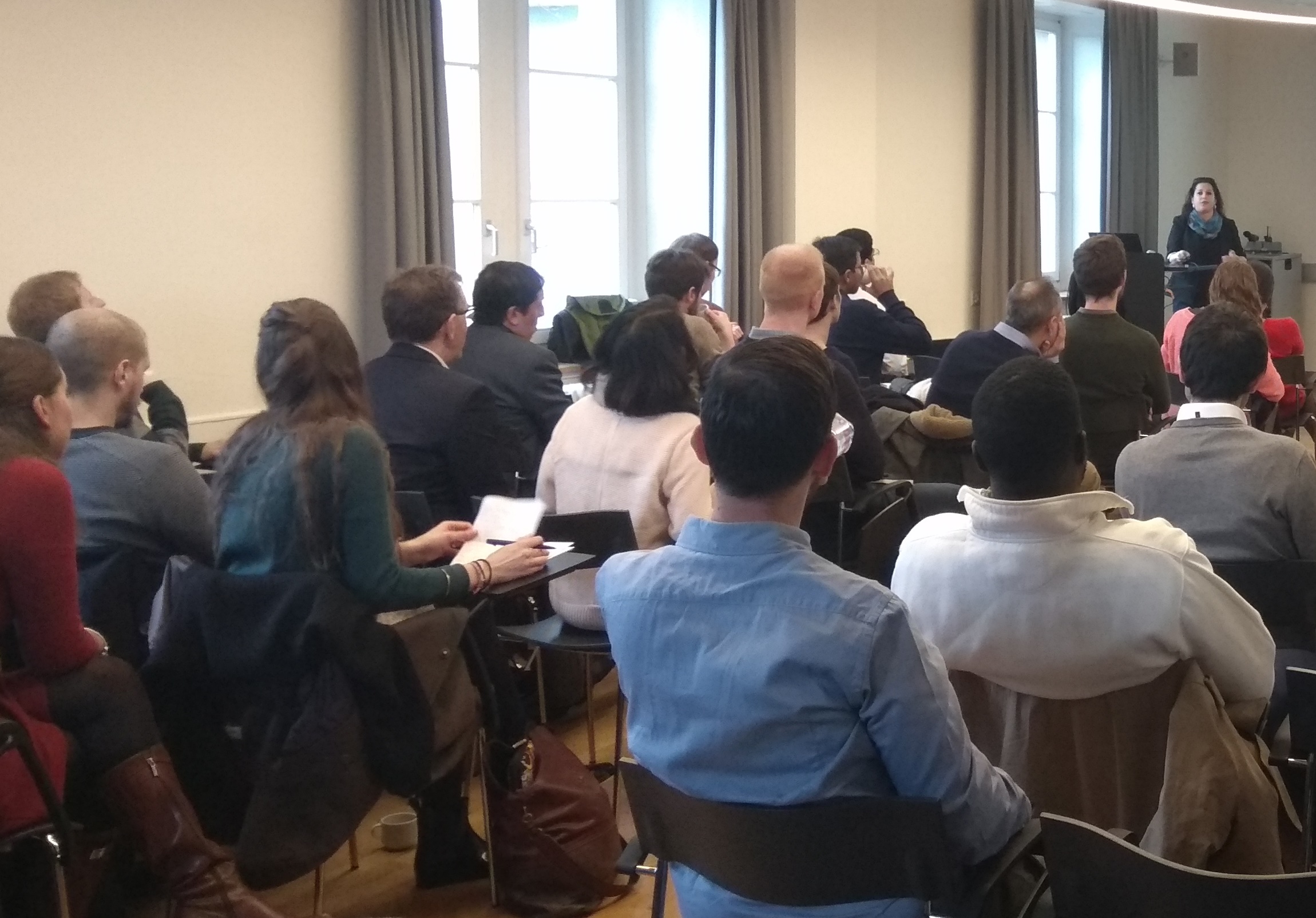
2017-12-22: The second Zurich Conference on Public Finance in Developing Countries took place on the 18./19. December. Over 60 economists and social scientists from across the world gathered at the Department to hear evidence from research on the effects of a wide range of taxation policies. In addition to the discussion of thefindings, Carlos Rebacarren (Servicio de Impuestos Internos, Chile) held a talk on how researchers can establish and maintain good relationships with the local governments during such projects.
2017-12-10: Excessive risk-taking is suspected to be one of the key contributors to the recent financial crisis. The reason for this is the suspected risk culture within the financial sector, consisting of norms and informal rules of behavior that might induce employees to take higher risks. However, to date, there was little or no empirical evidence to support this theory. In a recent study, Ernst Fehr and Michel Maréchal found that, in contrast to the general assumption, professional norms reduced the riskiness of the decisions taken.
Article on the Harvard Law School Blog
2017-12-19: Just because the motivation to donate an is emotional one, it does not mean that the choice and implementation cannot be guided by facts, explains Dina Pomeranz in Die Zeit. A contribution of CHF 100 will produce very different results, depending on how it is used. Today, we have the tools to measure the effectiveness of specific interventions e.g. for poverty reduction. Development economists call out aid organizations to carry out appropriate empirical analysis in order to use donations most effectively.
Article (in German)
Further Article on the topic: NZZ am Sonntag, 24.12.2017: Entwicklungshilfe bevorzugt Kleine. Hier
2017-12-12: Cryptocurrencies are baffling, even to the financially literate. As the main currency in the dark net, they are mainly being used by blackmailers, drug dealers, illegal weapons suppliers and, more recently, speculators. Their value has increased fourteen fold within the last year, and this upward trend has lasted for longer than the Dotcom-bubble. However, with practically no legit transactions to support the currency’s value – is it doomed for a crash? In the Frankfurter Allgemeine Zeitung, Joachim Voth explains under which conditions cryptocurrencies could sidestep a crash and how the current hype around them might just generate a self-fulfilling prophecy.
Read the article in German
2017-12-12: David Dorn’s research on Superstar Companies has received a lot of interest this year and has been picked up by major national and international media. In an interview in this week’s Weltwoche he explains how digitalization contributes to the consolidation across markets. The internet allows consumers to compare prices and choose the cheapest option. The company offering the best price will collect the lion’s share of the demand, thereby accelerating the consolidation process. In the long run however, these superstar companies could exploit their market power and start realizing monopoly rents, increasing the prices for consumers.
Download article (PDF, 768 KB)
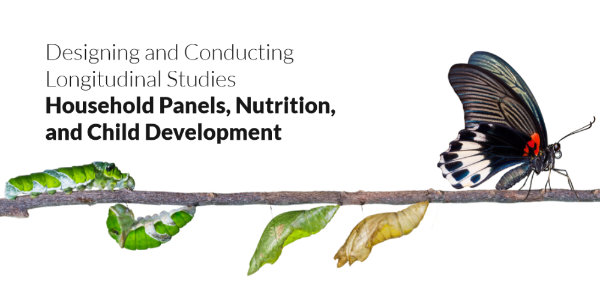
2017-11-30: Longitudinal studies are often the only way to analyze long-term development and crucial for economists, sociologists and psychologists. However, such panels pose several challenges related to sampling, tracking strategies as well as ethical concerns. The Jacobs Center Workshop on Longitudinal Studies brought together 30 international experts working on the design and maintenance of longitudinal panels. Presentations included insights and pitfalls when setting up new panels.
Podcast (coming soon)

2017-11-30: Lorenzo Casaburi presents an overview of recent findings from research on sub-Saharan African agricultural markets. The farming sector in Africa has undergone substantial transformation in recent decades, and even though questions still remain, he demonstrates how several positive developments allow for a positive outlook.
Read the article on VoxDev
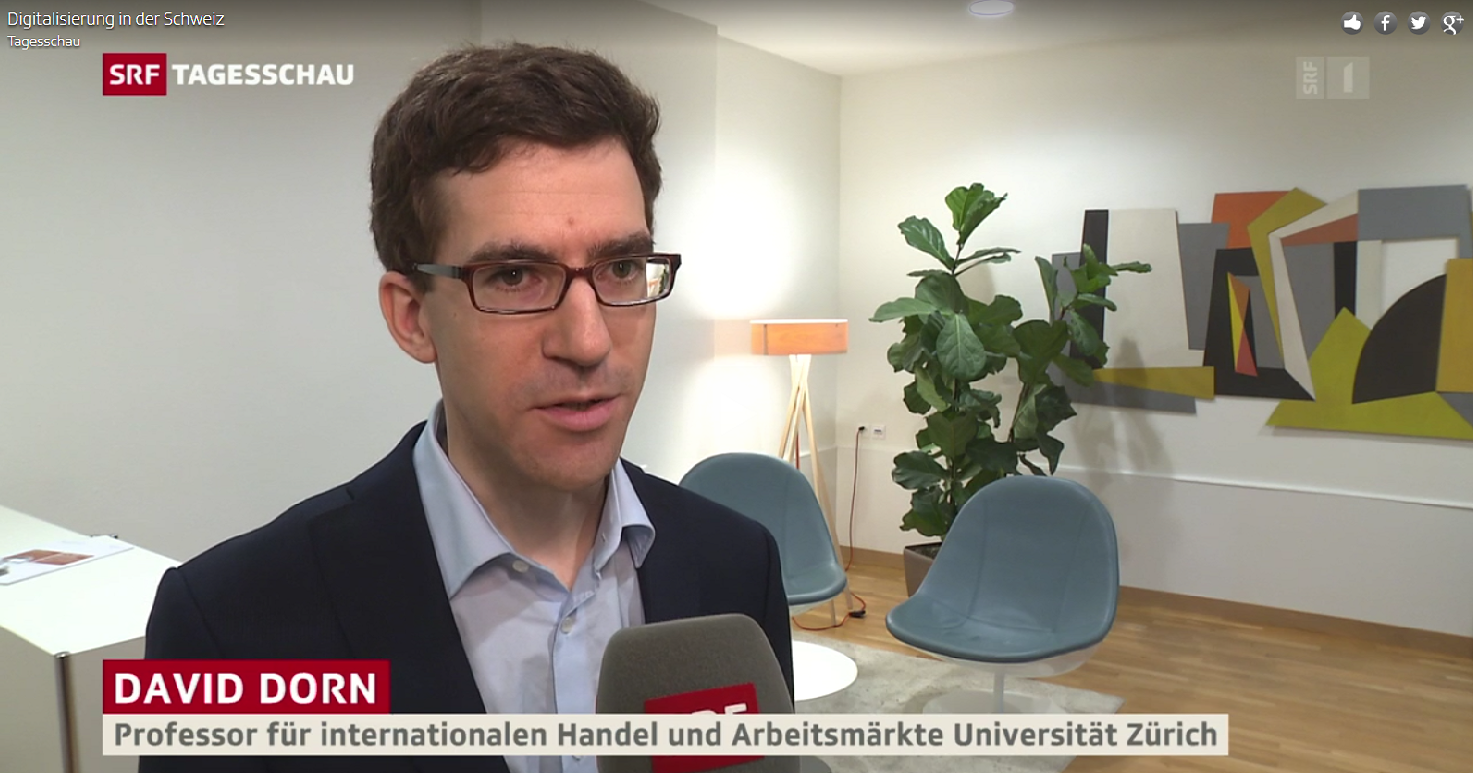
2017-11-29: The SRF 10vor10 news show interviewed David Dorn on the fears surrounding the job market and the ongoing process of digitalization. One concern, as he explains, is likely to be unfounded: even though machines are steadily replacing jobs, new jobs are being created at the same rate, with no loss in the total sum of employment. However, a consequence of the change is rising income equality. The professions being automated are mostly in the middle-income sector, which leads to a concentration on the higher and lower paid jobs and a widening income gap
Watch the program on SRF (in German)
2017-11-27: Switzerland is a model pupil regarding sovereign debt. The Federation has reduced its debt and interest payments significantly since 2009. This has the obvious advantage of extra cash in the vault. But, given the current interest rates, there is an argument to increase investments and short term debt and make some money doing so. Joachim Voth and Serge Gaillard, Head of the Federal Finance Administration and Member of the Advisory Board to the Department, assess the pros and cons in the SRF 10vor10 news.

2017-11-22: The question of what socially responsible housing policy should look like is on the mind of people across in Europe - and governments are looking for regulatory solutions. For a change, economists across the board agree that the regulation of rental prices is detrimental to landlords, the underprivileged it is trying to support, the structural quality of the available housing and the labor market, as Joachim Voth explains in the Finanz und Wirtschaft.
Article in Finanz und Wirtschaft (in German)
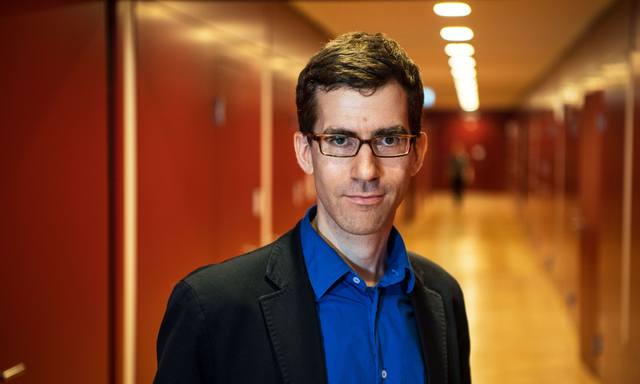
2017-11-18: The Tagesanzeiger covers David Dorn’s remarkable career. At the young academic age of 38, his papers on the effects of the rise of the Chinese economy on American society and politics have attracted the interest of central banks and governments across the globe. He questions many long-standing economic beliefs about free trade and emphasizes differentiating between countries based on local factors. Dorn also points out how economics has evolved from being a discipline based strongly on mathematical models towards the analysis of empirical data. This, he believes, brings it closer to the economic realities of life. The shift has also led to a decrease in ideological and dogmatic stances and the integration of contextual aspects.
Read the article in German
2017-11-21: Saving the world while still making a profit – could it be possible? Social entrepreneurs attempt to make it their goal, and for the first time, the University of Zurich offered a seminar in which students could not only acquire first-hand knowledge of what it means to become one, but also have the chance to implement their idea and be awarded with CHF 10’000, sponsored by the Excellence Foundation, to kick-start their business. The attendees of the seminar by Prof. Guilherme Lichand at the Department of Economics made their final pitches on Monday to a jury in the hopes of receiving funding for their business plans. The high level of the ideas called for praise from the jury, and a tight race was finally decided by awarding the prize money to EDUCAM, a project pitched by Rúben Marquillas and Raphael Metzler. Their business model, which focused on incentives to increase teacher attendance in schools in South America, featured a solid presentation and a simple, low-cost solution for schools to implement. Congratulations!
Read the whole coverage here
2017-10-27: The Wirtschaftswoche interviewed Ernst Fehr on why he considers economics to be a character-building discipline. Fehr’s research in over 50 countries has shown that individual honesty correlates strongly with economic growth: Cultures with low levels of honesty show slower growth rates. Pointing to such facts is politically sensitive, he notes, but it is important for governments to consider them in policymaking. In his opinion, nudging within a well-meaning democratic setting is less invasive and a smaller infringement to civil liberties than many a regulation. Promoting a culture of generalized trust, honesty and patience could go a long way.
Article in German (for Subscribers)
Reprint in German (with the kind permission of ©Handelsblatt GmbH)

2017-11-02 The Wall Street Journal published an article discussing the Center on Capitalism and Society's 15th Annual Conferenceat Columbia University about the economic legacy of Martin Luther’s 95 theses. Joachim Voth spoke on the effects of individual values on economic outcomes, pointing out that countries with a strong protestant history remain among the world’s richest. However, it is not Protestantism in itself that led these countries to prosperity; rather, it was the Protestant ideals that fueled economic growth. These encouraged people to read the bible for themselves, thus increasing literacy levels, and promoted a critical mindset that challenged existing beliefs and advocated an openness to new ideas.
Article in WSJ (for subscribers)
2017-11-01: American City Mayors are outbidding each other in their efforts to entice Amazon to locate their newly planned distribution center to their region. In the Frankfurter Allgemeine Woche, Ralph Ossa explains that in the bid for companies and the jobs they will bring, governors find themselves in a textbook version of the prisoner’s dilemma: Without knowing what the others are offering, an individual governor will offer competitive incentives and subsidies. These can end up being way higher than the income they might gain from a company relocating to their area, as the past has shown.
Article (PDF, 457 KB) in the Frankfurter Allgemeine Woche (in German)
2017-10-21: The Hessische Rundfunk interviewed Joachim Voth on stock market crashes and the improved response to them based on learnings from the past. In 1929 there were no central banks injecting liquidity into the markets, which lead to a spillover of the negative effects into the real economy. In 1987 and 2007 however, the central banks intervened and managed to curb the negative effects. Today, the fact that market agents know that central banks will support the markets if necessary, leads to other unintended and undesired effects. Voth also criticizes high frequency trading as it does not contribute to an economy in any way and increases the risk of automated flash crashes.
listen here (in German)
2017-10-18: The China Shock paper authored by David Dorn, David Autor and Gordon Hanson has made its way into the White House. Peter Navarro, who leads the White House Office of Trade and Manufacturing Policy, refers to their findings in a recent presentation. The work of the three academics has proven links between China’s accession to the World Trade Organization in 2001 and a row of social maladies that have fallen upon areas in the US affected most by China’s ascent. However, the article points out that not all effects that Navarro blames China for have been proven.

2017-10-18: Why neuroeconomics? The Neue Zürcher Zeitung visits the SNS-Lab of the Department of Economics and interviews Prof. Christian Ruff about the opportunities offered by – as well as concerns about – neuroeconomics experiments. While behavioral sciences already offer valuable insights, neuroeconomic research provides the possibility of understanding the mechanisms of decision-making and information processing in the brain. Consequently, the University of Zurich has one of the top Departments in the young discipline.
Interview with Christian Ruff (in German)
2017-01-17: The Austrian National Bank invited David Dorn to hold their Annual Global Economy Lecture in Vienna on October 11. Die Presse and the Salzburger Nachrichten spoke to him about his research and received evidenced answers on some of the most pressing questions of our time: the fear of robots replacing human jobs, ideological discussions regarding market interventions and (temporary) protectionist measures. He also presents the consequences of an ever-decreasing number of companies dominating the market in most sectors of the economy. A critical read.
Salzburger Nachrichten (PDF, 8 MB)
2017-10-09: Behavioral experiments have shown that women share a sum of money more generously than men. To gain an in-depth understanding of this behavior, Alexander Soutschek and Philippe Tobler looked at the areas of the brain that are active as such decisions are made. The striatum, located in the middle of the brain, is responsible for the assessment of rewards and is active during decision-making. Their research shows: The striatum was more strongly activated in female brains during prosocial decisions than during selfish decisions. By contrast, selfish decisions led to a stronger activation of the reward system in male brains. Their findings are the first to demonstrate that the brains of men and women respond differently to prosocial and selfish behavior.
Paper (in Nature Human Behaviour)
Media Coverage:
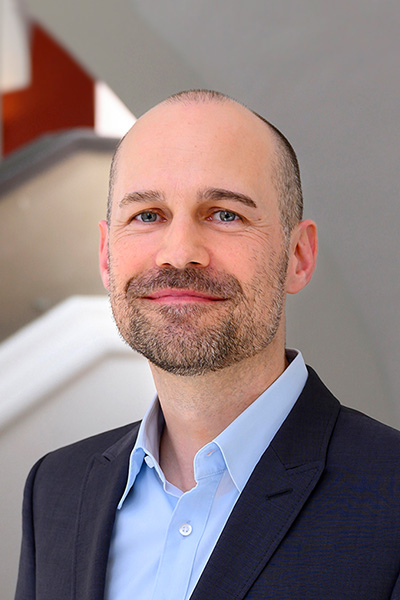
2017-10-11: Nudging is all the rage these days. The argument being that small nudges can encourage people to do things that are good for them, like saving for retirement, making healthier food choices etc. On the other hand, people can also be nudged into spending more on things they do not really need. A powerful concept, as its proponents argue. Nick Netzer takes some heat out of the discussion, pointing out that the effectiveness of nudging depends on how people make decisions. Are they fully rational and aware of their preferences and all the options, do they choose the first acceptable option they come across, or do they choose between options but have limited attention and knowledge? There is still some work to be done in understanding decision-making processes before we can truly establish the potential of nudging.
Article in the NZZ (in German)
2017-10-04: The ‘Marlene Porsche Foundation’ enables 14 students to obtain a PhD in the field of Neuroeconomics at the University of Zurich over the next decade. The young researchers will contribute to a better understanding of the brain’s influence on human behavior. The first students have already started their studies.
2017-09-30: In view of Catalonia's secessionist aspirations, the Wirtschaftswoche magazine examines and compares historical and ongoing secessions. Prof. Joachim Voth, who taught economic history at the Universitat Pompeu Fabra in Barcelona for more than a decade makes the political, social, and economic case for independence.
Article in Wirtschaftwoche
2017-10-03: Florian Scheuer has been elected member of the editorial board of the Review of Economic Studies. Board members agree to referee up to 12 reports per year and play an important role in the governance of the journal. The Review of Economic Studies is a top 5 economics journal and the most visible journal in Europe. Prof Scheuer is currently the second representative from Zurich serving on the Board. David Dorn was appointed member of the board in 2015.
2017-09-27: On October 1, Ulf Zölitz joins the Department as Assistant Professor of Economics of Child and Youth Development, endowed by the Jacobs Foundation. Professor Zölitz’ primary research interests are in the field of applied microeconomics. Before joining the Department of Economics he worked as a post-doctoral researcher at the briq Institute on Behavior & Inequality in Bonn. Some of his recent research has been covered by the mainstream media across Europe.
The Economist discusses a co-authored paper on the bias against women in academia
His research on the effects of cannabis on the achievements of high school students in the Washington Post
2017-09-26: Over the last few weeks a collection of international key media have picked up on David Dorn et al. recent paper When Work Disappears: Manufacturing Decline and the Falling Marriage-Market Value of Men, showing that the loss of manufacturing jobs in the US has had far reaching consequences for the young men affected. Not only do they lose their jobs, they also become less attractive to women and are less likely to be married. The consequences are spilling into the next generation with an increasing number of children growing up with single mothers.
A selection of the coverage:
2017-09-21: The Department had the honor and pleasure to welcome Esther Duflo and Abhijit Banarjee for a Public Lecture on Poor Economics: A radical way to rethinking the way to fight global poverty. During their lecture, the two MIT Professors presented a wide range of empirical findings on interventions they have tested over the last decade. Some of them improved the situation of the poor and some definitely did not. A lecture full of insights and surprises, well worth watching here
Interview with Banarjee and Duflo in the NZZ (in German)

2017-09-13: After the Department and its professors achieved excellent results in current rankings, Rainer Winkelmann talks with the Handelszeitung about the reasons, developments, and future visions behind the numbers. System changes as well as sponsoring and the acquisition of competitive research funding allowed for a focused growth that ultimately established the Department as a top place for economics on an international level. Future developments aim to continue this positive trend with sustained attention to high quality hirings, teaching and research.
Read the interview (in German)
2017-09-12: The German Handelsblatt published their ranking of Economics Departments and Professors in the German speaking area. The ranking is based on relevant research output in scientific publications. The Department ranks number one by far and is home to a considerable share of the experts: 10 of the top 100 Professors teach in Zurich, and 7 of 100 in the under 40s category. In the latter, Florian Scheuer (2nd place) and Ralph Ossa (4th place) achieved two remarkable results.
(the articles include links to the complete lists)

2017-09-08: Interview with Ernst Fehr in the NZZ on the choice an economist faces between spending his time on research, teaching, contributing to the public or engaging with politicians and the private sector. After dedicating most of his career deepening his understanding of human behavior he talks about the potential of small changes and nudges for policy making and business. Worth the read.
Article (in German)
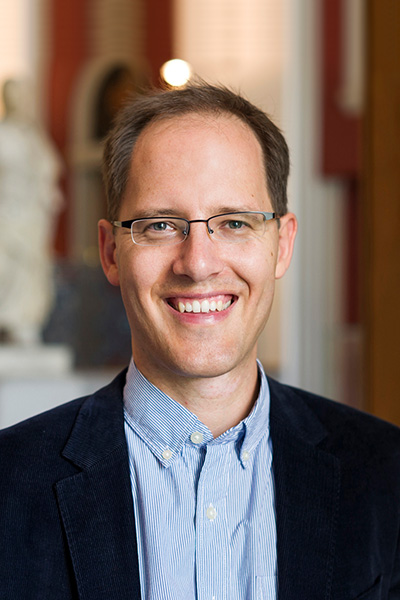
2017-09-08: 20 Minuten interviewed Florian Scheuer on the reaction and impact of Silicon Valley CEOs to the ending of the Daca Program for the so-called dreamers. Although Silicon Valley’s direct influence on the President is limited, they do have a very active lobby in congress, he explains. Their contributions to GDP as well as social- and health insurance are crucial to the American economy.
read more (in German)
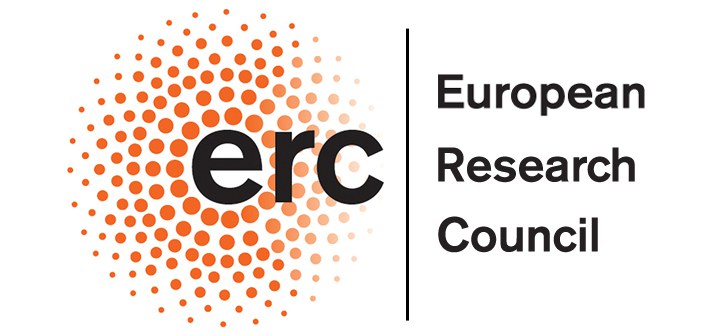
2017-09-07: Dina Pomeranz, Florian Scheuer and Rafael Polania received an ERC Grant to advance their research projects. We are proud that three of the four grants given to the employees from the University of Zurich went to the Department of Economics.
In her project, Dina Pomeranz examines various strategies of tax evasion and avoidance. These lead to billions of losses in government revenues worldwide, particularly in developing countries, where public funding for infrastructure and infrastructure could have a major impact. Her international project is being developed in partnership with the tax authorities in Chile and Ecuador.
Florian Scheuer is concerned with income and asset inequalities, which have increased drastically in many countries. The focus of his research is on the changed labor market conditions: automation and globalization lead to shifts from work to capital. This has consequences on the optimal taxation of profits, machinery and labor income.
Rafael Polania, currently PostDoc at the Department, entered a project on understanding the neural and computational mechanisms underlying human decision-making. With his ERC grant, he will take decisive steps to provide a neurophysiological characterization of how neural oscillations contribute to cognitive processes such as attention, short-term memory and value-based decision-making. He will carry out his research project at the ETH, starting in 2018.
read more (in German)
Press Release ETH for Rafael Polonia's Grant here

2017-09-06: The University of Vienna awarded the Oskar Morgenstern Medal to Ernst Fehr on 5th September. Fehr is the third person to have received this award. It was bestowed upon him for his research achievements in behavioral economics and neuroeconomics. Every two years, the Society for the Advancement of Economics at the University of Vienna awards the Oskar Morgenstern Medal for outstanding scientific achievements in the field of economics. The previous prize winners were the Nobel laureates Roger B. Myerson (2013) and Robert F. Engle (2015).
read more (in German)
About the medal (in German)
2017-09-04: The Tagesanzeiger and Süddeutsche Zeitung cover David Dorn’s recent paper The Fall of the Labor Share and the Rise of Superstar Firms, offering empirical evidence of national income shifting from employers towards equity owners. Dorn and co-authors find that, over the last years, the top four companies of a sector have significantly increased their market share and profitability, allowing them to reduce unit and workforce costs.
2017-09-01:The NZZ published their annual economist ranking, together with the Frankfurter Allgemeine Zeitung (Germany) and Die Presse (Austria). The ranking is based on performance in three relevant areas: academic output, media visibility and political influence. Ernst Fehr heads the list for the fourth year running. David Dorn’s much cited research on the US labor market, the effects of international trade agreements and the rise of the Chinese economy hoists him onto 15th place, an unparalleled increase of 28 places in one year. Congratulations!
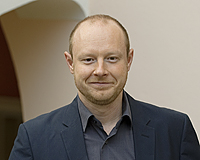
2017-08-31: Sleepiness, reduced concentration and performance – more and more people are suffering from the consequences of a chronic lack of sleep. Experiments on risk behavior carried out at UZH under the supervision of Prof Christian Ruff have now demonstrated a further consequence: fatigued people are subject to more intensive risk-seeking behavior without being aware of this riskier behavior. While a single sleepless night had no effect on risk-seeking, 11 of 14 of the subjects behaved significantly and increasingly riskier as the week of a reduced sleep duration went on. An additional finding is particularly alarming: The students assess their risk-taking behavior to be the same as under regular sleep conditions: We therefore do not notice ourselves that we are acting riskier when suffering from a lack of sleep.

2017-08-30: Dina Pomeranz, Assistant Professor of Microeconomics at our Department, recently published a paper on the limits of countering tax evasion in developing countries. Using third-party data to estimate the revenue of a company, tax authorities in Ecuador found that a quarter of the companies significantly underrepresent their revenues. Confronted with the mismatch and requested to submit an amended tax return, only few complied. The amended tax returns not only changed in revenue, but costs were also reported higher than before leading to a relatively small increase in tax revenue for the state. Pomeranz and her co-authors found that third party information is not a silver bullet in solving the tax compliance problem, as long as the enforcing infrastructure (capacity to follow up on evasion, poor legal regimes and corruption) is weak.
Read more on the article on VoxDev
Paper in American Economic Journal: Applied Economics

2017-08-30: David Dorn spoke at the Jackson Hole Economic Policy Symposium, held August 24-26 in Wyoming, discussing Nina Pavcnik’s paper on income equality. The symposium brings together economists, financial market participants, academics, government representatives and news media to discuss key long-term policy issues of mutual concern.
In an article on the symposium, Frankfurter Allgemeine Zeitung concentrates on the current debates on international trade agreements and highlights Dorn’s findings on the reasons people might have to oppose or endorse them.
The NZZ am Sonntag also picks up on the themes of his research, further exploring why job mobility in a changing industry is less than expected, and what consequences this development has on the marriage potential of men in the US.
2017-08-30: As of 1 September 2017, Prof. Michel Maréchal, born 1979, is appointed Professor ad personam for Economics of Organizations and Behavior. Prof. Maréchal studied Economics at the University of St. Gallen (HSG) and completed his PhD at the Institute for Empirical Economics and Economic Policy at the HSG as a research and teaching Assistant. From 2007 onwards, he was a senior teaching and research assistant at the Faculty of Business, Economics and Informatics (WWF) at the UZH. In 2011, he was appointed Assistant Professor of Experimental Economics.
As of 1 October 2017, Dr. Ulf Zölitz, born 1985, is appointed Assistant Professor of Economics of Child and Youth Development. He is currently a postdoctoral researcher at the Behavior and Inequality Research Institute (briq) in Bonn. His research interests lie in the field of labor economics, economics of education and behavioral economics, and he wrote his PhD thesis on «The Nature and Consequences of School Choice».
Congratulations!

2017-08-24: What connects Iceland, graphic processing units and criminals? In a new opinion piece for Finanz und Wirtschaft, Joachim Voth delves into the intricacies of cryptocurrencies and the current boom they are experiencing. While the rise of bitcoin and co. has been impressive, Voth questions the real-world value of the currency and the driving forces behind their ascension.
Read the full article on Finanz und Wirtschaft (in German)
2017-08-23: Several studies carried out by David Dorn and co-authors continue to form the basis for central arguments about, and analysis of, global political and economic developments in the media. The research, focusing on various aspects of international trade and its socioeconomic impacts, is not only relevant for the US under Trump, but also for trade and labor market issues on a global scale. Recent articles referencing the findings of Autor, Dorn and co. include the following:
The Washington Post covers NAFTA renegotiations, citing this study on labor market effects
The implications of minimum wage and automatization are the subject of a Bloomberg View article, building on Dorn’s research findings
Frankfurter Allgemeine Zeitung’s article covers the German market and paradoxical development of higher employment rates and lower wage trends, with Dorn providing a grim estimation for workers as their share of profits wane in relation to those of capital owners in the age of superstar companies
The Atlantic explores how marriage is increasingly becoming seen in economic terms, citing the study When Work Disappears: Manufacturing Decline and the Falling Marriage-Market Value of Men
Vox comments on the recent departure of Steve Bannon from Trump’s White House and the errors surrounding fears of globalization effects and trade policies, pointing out the influential study on the “China Shock”.
Similarly, the Financial Times, also using Dorn's study to argue about the same topic, warns from using zero-sum thinking and war rhetoric when it comes to trade negotiations.

2017-08-23: Lorenzo Casaburi, Assistant Professor of Development Economics at our Department, has a new paper that aims to find solutions to increase cooperation between crop farmers and insurers for their mutual benefit. While the need for insurance is ostensibly high due to the inherent risks of the trade, challenges such as low trust in or unfamiliarity with insurance and inopportune timing of payments have kept demand lower than expected. Casaburi, together with his co-author Jack Wills, showed with several experiments that changing to a system with pay-at-harvest premiums – instead of upfront – strongly increased insurance adoption for smallholder crop farmers.
Read more about the study in an article by the authors on VoxDev
Link to Working Paper
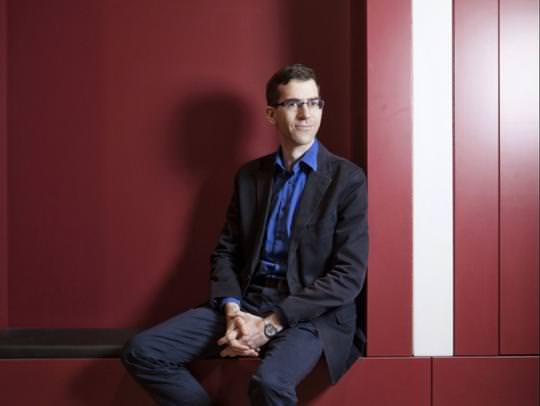
17-08-2017: A new article by David Dorn, published in Finanz und Wirtschaft, examines the aspects behind the rise of superstar companies as well as the resulting effects on market shares, innovation incentives, and income inequality. Drawing from his research, he provides an overview of likely causes for the shift in market dominance and outlines the impacts it has had equity ownership and wage ratios. Read the full article in Finanz und Wirtschaft (in German)
Prof. Dorn's research is the also the basis of an article covering the same subject in Tages Anzeiger, which highlights the global decline of earned income ratios: read the full article on TagesAnzeiger Online (in German)
A study by David Yanagizawa-Drott published in the current edition of The Quarterly Journal of Economics provides the first large-scale empirical assessment to understand the reasons of low adoption of new agricultural technologies (fertilizer and hybrid seed) in local markets in Africa. Their findings show that quality is variable and generally rather low. Also, price is not a reliable indicator of quality. Therefore, farmers cannot infer quality from the price. This reduces the incentive for a high-quality producer to build up and maintain a reputation.
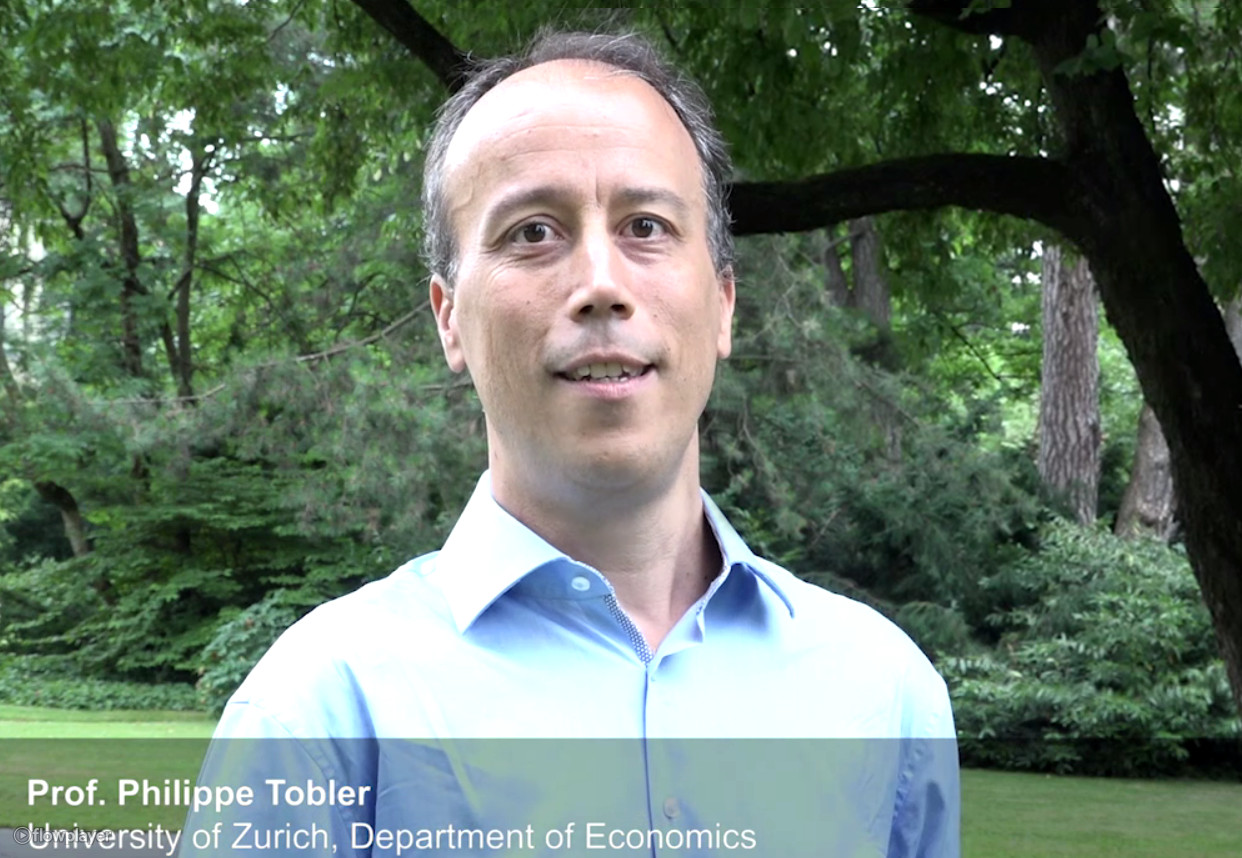
2017-07-11: A new study by a team around Soyoung Park and Philippe Tobler shows how a little generosity can make us happier - even if it just promised. The experiment, which was carried out at the Laboratory for Social and Neural Systems Research (SNS Lab) at the Department of Economics, asked participants to commit to either selfish or generous actions, and measured the activity in their brain regions while doing so. The resulting intensified interactions in the brain demonstrated how even altruistic intent can lead to happiness.
Press Release
Read the study in Nature Communications
Watch Philippe Tobler explain the findings in a video
Related articles: Time Magazine, Neue Zürcher Zeitung, Business Insider, Die Zeit, Watson, Die Welt, Business Standard, La Vanguardia, Der Standard, Radio SRF2
2017-07-05: Media outlets Watson and 20 Minuten report on Ralph Ossa's newest research on possible ramifications of trade wars and his findings on the consequences for Switzerland. Recent tensions in trade talks give rise to the need for a better understanding of tariff effects, a topic that Ossa analyzed with quantitative models in a what-if scenario. His findings suggest that the gains from international trade for Switzerland are higher than presumed, and while a US-China tariff increase would not have a large impact on the Swiss economy, effects from a US-EU conflict could significantly lower overall exports and wealth.
Read the articles at Watson and 20 Minuten (both in German)
Ralph Ossa on Google Scholar

2017-07-04: The American Economic Review announced their list of awards for referees who provided exceptional service to the Review by a large number and quality of referee reports in 2016. This year, David Dorn, Florian Scheuer and Joachim Voth received the AER Excellence in Refereeing Award for the dedication and time they devoted to the advancement of the field.
Read the full report: American Economic Association

2017-06-28: In it's program "Input", SRF3 explores why we buy seasonal fruits to protect the environment yet regularly fly to holiday destinations. Christian Ruff provides answers in an interview and explains which factors determine our decisions in the brain. Our inner reward system favors the unknown and exotic, and the joyful sensations simulated by our brain while choosing holiday destinations cause us to prefer the Bali beach in the travel brochure over the familiar and more realistic image of Lake Lucerne - thus ignoring our ecological conscience. Conversely, an increase in open discussion in our social circle can have a significant influence on environmental awareness and actions.
Listen to the entire program on SRF Online (in German)
2017-06-24: The Economist discusses the repeal of a long held economic paradigm and refers to a recent paper by Nir Jaimovich. Until the mid-1980s productivity increased during booms and slowed in recessions. Currently, we see the opposite: productivity growth leaps in recessions and slows during booms. Prof Jaimovich’s paper argues that firms began responding to recessions by eliminating or outsourcing routine jobs and thus used recessions to implement labour-saving structural changes that raised productivity and made it easier to accommodate rising demand without hiring new workers.
Article from «The Economist»
2017-06-18: Article on Ernst Fehr about pushing the boundaries of knowledge and making the world a better place. In the interview, he also offers a solution for appropriate and fair management compensation practices based on value-adding parameters.
Sonntagsblick (PDF, 292 KB) (in German)

At this year’s Annual Congress 2017 of the Swiss Society for Economics and Statistics titled "Economists and Policy Making", Liu Liu (PhD, Department of Economics, UZH) was awarded the prestigious Young Economist Award. The event took place in Lausanne from June 8-9, 2017. We applaud Liu on this amazing success. Congratulations!
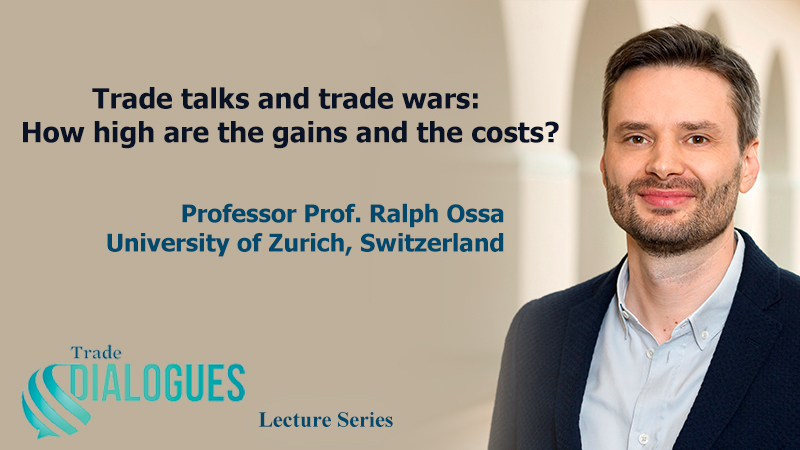
2017-06-13: As part of its Trade Dialogues Series, the WTO invited Ralph Ossa to share insights from his research on the benefits of trade talks and the possible costs of a full breakdown of international trade policy cooperation.
Watch a short video of Ralph Ossa summarizing his lecture, listen to the full audio or read the presentation.
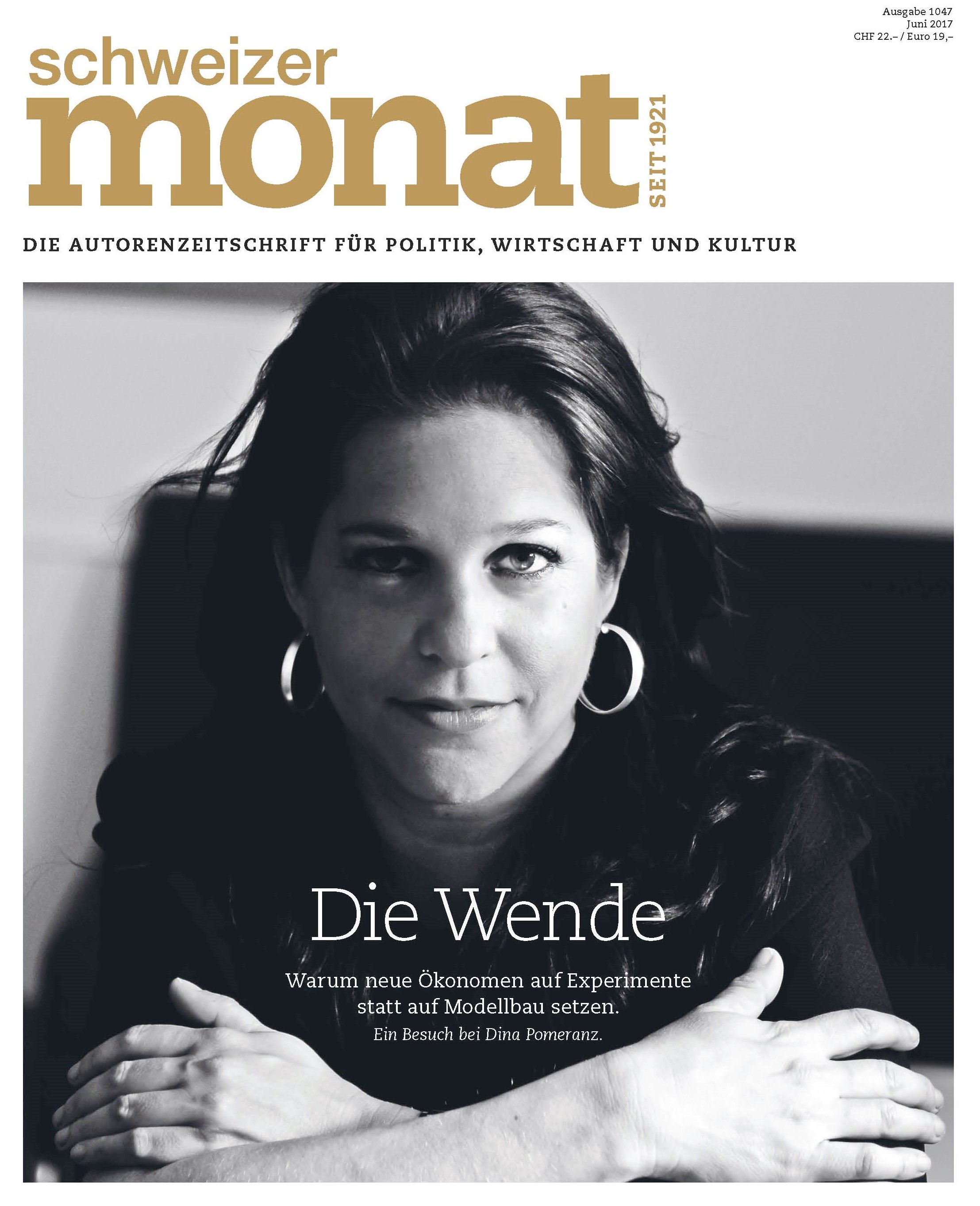
2017-06-07: In the current edition of Schweizer Monat, Dina Pomeranz talks about developments in economics, tackles questions about the self-awareness of economists, and makes a strong case for the utilization of experiments and empirical methods in economic research. Examples from previous studies, including her investigation of VAT implementation in Chile, provide additional, real-world insights into the vast range of topics covered by the field of economics.
Read the interview here or download (PDF, 4 MB)
2017-06-01: A recent study by Joachim Voth and his co-authors shows that social capital can be used for good or bad depending on the political and institutional context. The use of new data on the networks of associations and organistions in 229 German cities from the inter-war period showed that cities with denser networks had higher rates of party affiliation. According to the authors, the density of these networks contributed to the rise of the Nazi Party. Although these are unique historical data that document the role of physical organizations, their potential implications for our current circumstances regarding the Trump administration should not be overlooked. The study was published in the Journal of Political Economy in April 2017, and discussed in the recent edition of Nature Human Behavior.
Comment in Nature (for subscribers only)
Prof. Marek G. Pycia has been appointed Professor for Organization Economics as of July 1, 2017. Marek Pycia obtained a PhD in Mathematics from the Polish Academy of Sciences and a PhD in Economics from the Massachusettes Institut of Technology. He is currently Associate Professor of Economics at the University of California (USA). His recent research includes the analysis of matching mechanisms, auctions and risk aversion.
Prof. Nir Jaimovich has been appointed Professor for Economics, as of July 1, 2017. Nir Jaimovich obtained his PhD from the Northwestern University in Chicago and is currently Professor of Economics at the University of Southern California (USA). His research focuses on business cycles and the dynamics of the labor market.

2017-05-25: Florian Schaffner’s doctoral thesis on online dating behavior provides the basis for an article in the newest edition of the NZZ Folio, which explores the topic of sex and gender roles. In his thesis, Florian Schaffner empirically studied the preference parameters and differences in mobile dating behavior between men and women and the asymmetries resulting from it.
Read article in NZZ Folio (in German)
2017-05-14: The NZZ am Sonntag presents recent research by David Dorn on how a small number of companies dominating a sector leads to lower shares of labor vs capital gains. The article also offers ideas on how to counterbalance the resulting inequality within a society.
Read the article (in German) (PDF, 2 MB)
Radio Interview on SRF Echo der Zeit (04.07.2017): Listen
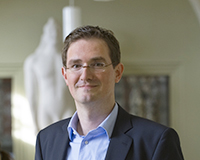
2017-05-10: In an interview with the newspaper Handelszeitung, Mathias Hoffmann provides insight on what Switzerland can expect from the new French president – a former banker - and future negotiations with the EU after the election: improved stability and benefits for the exporting industry on the one hand, and less concessions from a newly strengthened EU on the other.
Full interview in Handelszeitung (in German)

2017-05-10: In a recent article, The Economist cites research by Hans-Joachim Voth to present the argument that periods of threat and war have spurred the creation of strong governments by inciting spending on security, education and infrastructure. Peaceful times, however, caused politics to become less effective. In their research paper, Hans-Joachim Voth and Nicola Gennaioli analysed the emergence of powerful, centralized states in Europe after 1500 in reaction to the increasing importance of money for military success.
2017-05-01 In interviews with NZZ am Sonntag and SRF News, Ernst Fehr talks about new findings indicating that management enumeration often does not correspond with their objective achievements and are based on a false index, sometimes even rewarding poor performance. Implementing a system that juxtaposes a company's performance with a comparison group would create a fairer indicator and take external factors, such as macroeconomic fluctuations, into consideration.
Interview with NZZ am Sonntag (Download (PDF, 573 KB))
Related article: "Was sie verdienen", Süddeutsche Zeitung (in German)
2017-03-26: In a recently published column on Vox, Ralph Ossa and his co-authors expand on the notion that in addition to lower prices for imported goods, trade agreements also benefit the domestic welfare by increasing import variety and average domestic productivity. Their research shows that these positive effects are countered by the welfare loss associated with the reduction in domestic variety (smaller domestic firms are pushed out of the market), and the fact that liberalization also leads to less productive non-domestic firms entering into the market, reducing average productivity.

2017-04-10: Studies have shown that the level of happiness over the span of a lifetime resembles a u-curve with the highest peaks at age 23 and 67. In an interview with jetzt, part of the Süddeutsche Zeitung network, Hannes Schwandt explains how the relationship of expectations and reality shifts over time and influences our happiness as we age.
Link to Article (in German)
2017-03-31: There is a good reason why American politics seem to be obsessed with the manufacturing industry. When large plants close down, the towns around them change drastically. Men with low education levels are hit hardest: They lose their income, become less marriageable and are likely to adapt an unhealthy and dangerous lifestyle. More children are born to single mothers with higher poverty risk. There are no simple answers to these challenges, but it is important that politicians address them, says David Dorn in his comment in this week’s Finanz und Wirtschaft.
Read the Article (in German)

2017-03-30: The University of Antwerp conferred an honorary doctorate to Prof. Ernst Fehr. He received this for his groundbreaking contribution to the development of economics into a multidisciplinary behavioural science and, in particular, for his pioneering role in neuroeconomics, in which insights and methods from neuroscience are used to expose the foundations of human decision-making in a socioeconomic context. Congratulations!
Watch trailer by the University of Antwerp

2017-03-23: In the current edition of the «Weltwoche»David Dorn talks about the effect of digitalization on productivity and the workforce. Contrary to general belief, recent data of industrial nations shows limited growth of GDP during the last decades. Looking back further into history, technical advances led to much larger increases of productivity. Dorn explains that, in contrast to the current digital revolution, e.g. the industrial revolution was a time of innovations across many areas, spurring on widespread increases in productivity and growth.
Read the article (PDF, 756 KB) in German
2017-03-20: In the current edition of the «Finanz und Wirtschaft» Joachim Voth discusses how Berkeley manages to be at the top of academic league tables with a fraction of the budget of private US Universities. What makes them so efficient in turning their funding into academic excellence, and what can Europe and Switzerland learn from them? According to Voth, a key weakness of the European system is the rigid salary structure of most universities, leaving most professors either over- or underpaid. The former is a waste of resources while the latter leads to difficulties in retaining top league academics.
Read the article (in German)
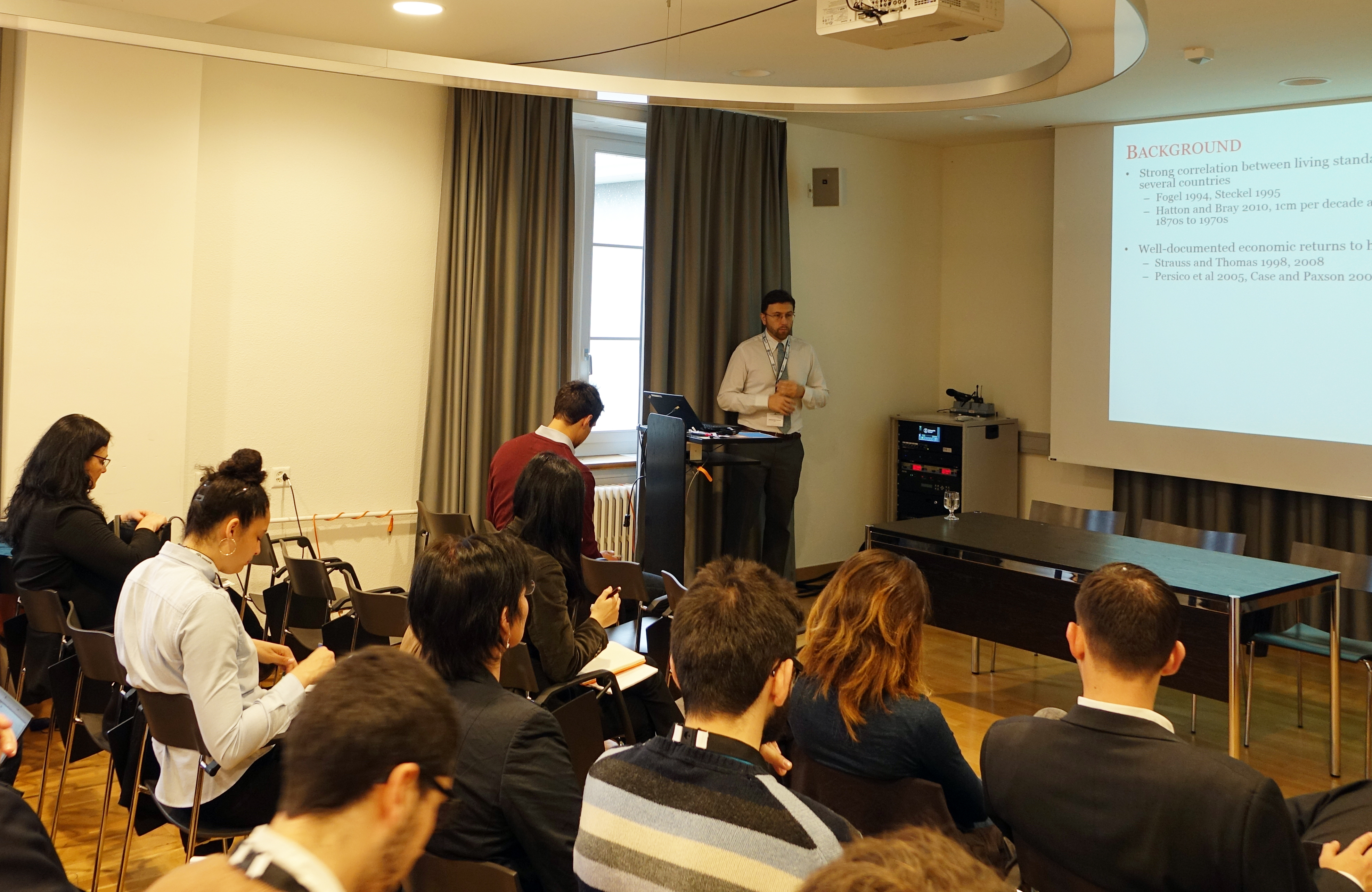
2017-03-17: This year’s conference of the Center for Child Well-Being and Development focused on Social Norms and Behavior as well as Climate Change and Resilience. The aim of the conference was for researchers to provide evidence-based findings and recommendations for NGOs and relief organizations to improve the design of intervention programs. Internationally renowned speakers presented their work on topics such as child marriage, nutrition, health and hygiene as well as harmful practices against young girls and teenagers, for example Female Genital Cutting. More than 50 researchers and representatives of foundations took part in the lectures and contributed to the roundtable discussions.

2017-03-16: The Department of Economics and the Müller-Möhl Foundation invited the public to a joint event at the University of Zurich with their special guest, Richard David Precht. More than 1300 guests came to listen to the philosopher, publicist, and bestselling author present his views and discuss this explosive and highly topic of conflict with Professor Ernst Fehr.
Values are an expression of what people consider important, the needs they have, and what the most important determinants of their lives are. But how do our values and value hierarchies actually develop?
One thing is clear for Richard David Precht - we live in revolutionary times and are on the verge of a new age. Digitalization has brought on profound changes. Social interaction and the working environment are facing radical changes. According to Precht the population has a sense that the current model has no future but lacks alternative visions.
A central concern of the philosopher: “We must prepare ourselves for all other scenarios and critically reflect the current situation”. For society, Precht sees a gloomy and less promising future, characterized by inequality and an ever-increasing gap between the rich and the poor. This, says Precht, provides an optimal breeding ground for populism. However, he does not believe that populists are an acute threat to our society, as long as they can’t offer a viable plan for economic prosperity to a society.
Read the 12App article (in German)
Watch the SRF television news feature (in German starting at 6:13 min)
Watch speech on Youtube (in German)
2017-03-12: In a recent issue of the Austrian daily newspaper "Die Presse" Ernst Fehr expounds various aspects of education policy and the need to convey fundamental economic concepts in schools. Many school leavers do not understand compound interest rate effects or have no idea about the effects of free trade on the economy as a whole. He pleads for evidence-based education programs and underlines the need to invest in preschool education, as these interventions are many times more effective than retraining programs for adults.
Read the article (PDF, 1 MB) (in German)
2017-02-15: A recent paper co-authored by David Dorn follows a new approach to why workers' share of total GDP has continuously fallen over the last decades in the US. The authors show that the share of revenue controlled by the top four companies within an industry has risen drastically during this period, with the figure nearly doubling in some industries. These winning companies become increasingly profitable with falling shares of labor. Technology and the increase of information-intensive goods with high fixed and low marginal costs (e.g. software platforms and online services) are key drivers to this development.
Article in Bloomberg
Comment in Bloomberg View
Article in The Atlantic
Article in the New York Times
Article in Finanz und Wirtschaft (German)

2017-02-01: David Hémous held a presentation on the enabling factors and economic effects of innovation and productivity in France and Europe at the conference of France Stratégie (the economic advisory council to the Prime Minister) and the Banque de France.
Watch the presentation (starts 3:20:15)
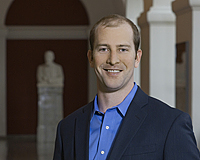
2017-02-01: Prof. Dr. Todd Hare, born 1980, has been appointed Associate Professor for Neuroeconomics and Human Development. Prof. Hare studied Biology at Iowa State University, USA. In 2007, he received his PhD in Neuroscience at the Weill Graduate School of Biomedical Sciences at Cornell University, USA. He spent the following years as a Postdoctorate Research Fellow at the California Institute of Technology in Pasadena and joined the Department of Economics in 2010 as Assistant Professor for Neuroeconomics.
Congratulations!

2017-02-01: A new center at the Department of Economics called the “Center for Child Well-Being and Development” evaluates programs to improve future policies for children’s well-being. Thanks to the funding by Unicef as well as the Swiss Agency for Development and Cooperation, progress can be made on child well-being across the world.
2017-01-16: In view of the WEF 2017, SRF Eco discusses globalization, it's limits, losers and future. In an interview David Dorn explains how globalization also shapes the political landscape.
2017-01-11: In the current edition of the Journal of Neuroscience Silvia Maier and Todd Hare show that higher heart-rate variability (HRV) is associated with increased resistance to temptation in dietary self-control challenges. HRV may serve as an easily acquired, noninvasive, and low-cost biomarker for self-control ability.
Article in Neuroscience

2017-01-04: The «National Geographic» refers to a new study by Hannes Schwandt and Janet Currie, on the impact of the dust clouds from the collapse of the twin towers on the birth weight outcomes for Lower Manhattan mothers.
Research Paper (Journal of Human Resources)

2017-01-03: Michel Maréchal and David Yanagizawa-Drott received the “Excellence in Refereeing Award” from the European Economic Association. The Award recognizes the outstanding work of those referees whose service and dedication have contributed to the high quality and prestige of the Journal of the European Economic Association. Congratulations!

2017-01-01: In his comment on Bloomberg View, Noah Smith lists the 10 most influential and accessible papers of 2016. In third place, the paper by David Dorn et al.: The China Shock: Learning from Labor-Market Adjustment to Large Changes in Trade.